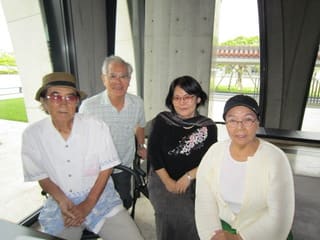
Research Projects
These are several research projects which I’ve been exploring:
1. Genealogy of Kumiodori(組踊)---From Chokun’s five masterpieces to Okinawa Shibai, and Jinruikan (The House of Man).
This is a Grant-in-Aid for Scientific Research (C) 2009~2012.
2. The distorted image of Okinawa seen in the Novel, Drama, and Film of “The Teahouse of the August Moon.”
This is a Grant-in-Aid for Scientific Research (C) 2010~2013.
3. Women in Modern Okinawa Drama
–How Sexuality and Gender are represented in Modern Performing Arts in Okinawa- (PhD dissertation)
4. Performing Shakespeare in Okinawa
---Shakespeare in Kumiodori and Okinawa Shibai--
5. Tragedy and Comedy—A Comparative Study of the Western theatre and Okinawan theatre
6. Comparative study of Drama in Wales (or Ireland) and Okinawa—How performing arts and languages are deeply related.
7. Novel prize-winning playwright Harold Pinter and Medoruma Shun ---how Politics and Arts (novels and plays) interact.
Introduction to details on each project:
The first project is supported by MEXT KAKENHI (21520147). The purpose of this project is to explore how the main essence of the art forms/styles of Kumiodori had been succeeded by a newly invented Okinawa Shibai during the Meiji period and how they have been developed/represented into the forms/styles of Okinawa Shibai and the contemporary play “Jinruikan,”(The House of Man).
The second project is also supported by MEXT KAKENHI (22520289). The purpose of this project, undertaken with three researchers, is to explore how the image of Okinawa represented in the novel, drama, and film of “The Teahouse of the August Moon”, was distorted. Three researchers are going to research the different effects/images of each genre and also how those images were represented to the different audiences. Different critical views are also re-examined. The three of us are planning to participate an international conference to present the result of the research in the US in 2012.
The third project is the theme of my PhD dissertation at the University
of the Ryukyus. My focus is how women were/have been represented in
the modern/contemporary Okinawa dramas, especially within the process of
assimilation to Japan, together with the general phenomena of how women were represented/imagined in dramas. Accordingly how sexuality and gender were/have been culturally penetrated/represented in modern Okinawan dramas are essential to clarify main characteristics of modern Okinawa dramas.
The fourth project is one that I have been exploring for many years. Shakespeare is such a strong ‘Icon’ in the world of theatre, that his works function as the carrier of different cultural representations and images. Just like common theatre languages, many different cultural Shakespearean works are performed over the world. In this sense Shakespeare has contributed to unite the West and the East. My project “Performing Shakespeare in Okinawa” is on this trend. For example, I’ve already compared Hamlet, focusing on its original story Ur Hamlet, and depicted it as a symbol of a revenge story in Okinawa drama, too. Not only Hamlet but there are an Okinawan Othello, Romeo and Juliet, Macbeth, and Midsummer Night Dreams. I plan to compile all of these adapted Shakespearean Okinwan dramas, carefully analyzing differences and similarities and how the performances were accepted by the Okinawan public.
The fifth project is one that I have already written about concerning the different concept and rhythm of tragedy in the paper---The Tragic Rhythm: the comparison of Western Theatre and Okinawan Theatre: in the plays of King Oedipus and Shushin Kaneiri “Lust and the Bell.” (Okinawa university, 1999). However, I haven’t completed the section related to the difference and similarity of comedy represented in the Western and Okinawan Theatre. I’ve made some analysis of the comedy, but it is necessary to explore and analyze the essence. Shakespearean comedies are going to be compared with Okinawan Comedy dramas.
The sixth project is about a keen concern of present-day Okinawan performing arts regarding the preservation of Okinawan/Ryukyuan. We are not used to talking in the Okinawan language any more, therefore, a genuine sense of language and rhythm has been missing, which in turn is an urgent issue for restoring the cultural identity in Okinawa. In this respect, I would like to do comparative research of Wales and Ireland, how the Celtic cultures and languages are preserved and revitalized in their daily lives as well as in the performing arts. I wish for this comparative study to be able to contribute in preserving the cultural memories of the language with its ethnic identity and re-vitalizing Okinawan performing arts.
The seventh project has also been in my mind for years as Harold Pinter was very popular when I was studying at the University of Kansas in the 80s. Pinter’s plays were often directed at that time. Pinter’s absurdist plays are striking as the ending of the plays are ambiguous. My interest in him has increased since he was awarded “The Novel Prize for Literature,” in 2005. Besides, he was a strong political activist. I wonder why he had to have such an intense political voice (being), even if rejected/ignored by the BBC. Pinter was against the war in Iraq, and his political views towards the US were uncompromising. Why? He reminded me of the Okinawan novelist Medoruma Shun. His stance is also valid. His novels symbolize the very power structures forced on Okinawa as they accurately describe the memories of the devastating battle of Okinawa and the Okinawan people. Eventually, both Pinter and Medoruma have stimulated my curiosity/consciousness, inviting a comparison of both writers’ political stance and how their activities and works are interrelated to one another.
In conclusion, some projects require urgent commitment while others, having been with me for years have to be tackled in an appropriate manner.
*********
(TAMAKI,Shin and YOSHIDA, Taeko are Okinawan play actors. SHINJO, Eitoku is a stage artist of Okinawa play)



















